
Rwanda, officially the Republic of Rwanda, is a landlocked country in the Great Rift Valley of East Africa, where the African Great Lakes region and Southeast Africa converge. Located a few degrees south of the Equator, Rwanda is bordered by Uganda, Tanzania, Burundi, and the Democratic Republic of the Congo. It is highly elevated, giving it the sobriquet "land of a thousand hills", with its geography dominated by mountains in the west and savanna to the southeast, with numerous lakes throughout the country. The climate is temperate to subtropical, with two rainy seasons and two dry seasons each year. It is the most densely populated mainland African country; among countries larger than 10,000 km2, it is the fifth-most densely populated country in the world. Its capital and largest city is Kigali.

Kigali is the capital and largest city of Rwanda. It is near the nation's geographic centre in a region of rolling hills, with a series of valleys and ridges joined by steep slopes. As a primate city, Kigali is a relatively new city. It has been Rwanda's economic, cultural, and transport hub since it was founded as an administrative outpost in 1907, and became the capital of the country at independence in 1962, shifting focus away from Huye.
Human occupation of Rwanda is thought to have begun shortly after the last ice age. By the 11th century, the inhabitants had organized into a number of kingdoms. In the 19th century, Mwami (king) Rwabugiri of the Kingdom of Rwanda conducted a decades-long process of military conquest and administrative consolidation that resulted in the kingdom coming to control most of what is now Rwanda. The colonial powers, Germany and Belgium, allied with the Rwandan court.
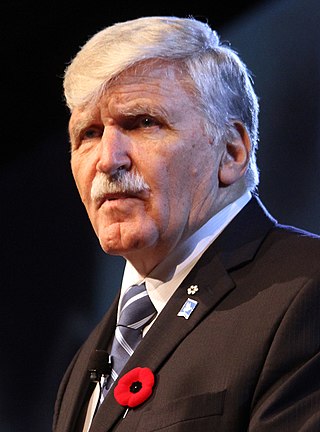
Roméo Antonius Dallaire is a retired Canadian politician and military officer who was a senator from Quebec from 2005 to 2014, and a lieutenant-general in the Canadian Armed Forces. He notably was the force commander of UNAMIR, the ill-fated United Nations peacekeeping force for Rwanda between 1993 and 1994, and for trying to stop the genocide that was being waged by Hutu extremists against Tutsis. Dallaire is a Senior Fellow at the Montreal Institute for Genocide and Human Rights Studies (MIGS) and co-director of the MIGS Will to Intervene Project.

The Rwandan genocide, also known as the genocide against the Tutsi, occurred between 7 April and 19 July 1994 during the Rwandan Civil War. During this period of around 100 days, members of the Tutsi minority ethnic group, as well as some moderate Hutu and Twa, were killed by armed Hutu militias. Although the Constitution of Rwanda states that more than 1 million people perished in the genocide, the actual number of fatalities is unclear, and some estimates suggest that the real number killed was likely lower. The most widely accepted scholarly estimates are around 500,000 to 800,000 Tutsi deaths.
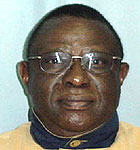
Théoneste Bagosora was a Rwandan military officer. He was chiefly known for his key role in the 1994 Rwandan genocide for which he was sentenced to life imprisonment by the International Criminal Tribunal for Rwanda (ICTR). In 2011, the sentence was reduced to 35 years' imprisonment on appeal. He was due to be imprisoned until he was 89. According to René Lemarchand, Bagosora was "the chief organizer of the killings". On 25 September 2021, he died in a prison hospital in Mali, where he was being treated for heart issues.
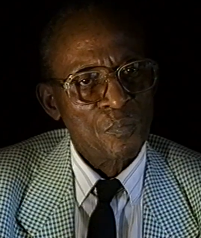
Théodore Sindikubwabo was a Rwandan politician who was the interim President of Rwanda during the Rwandan genocide, from 9 April to 19 July 1994. Prior to that, he was President of the Rwandan legislature National Development Council from 1988–1994.

Singapore General Hospital (SGH) is an academic health science centre and tertiary referral hospital in Singapore. It is located next to the Bukit Merah and Chinatown districts of the Central Region, close to the Outram Community Hospital (OCH), which functions as a supplementary community and rehabilitation hospital to SGH for newly discharged patients. There is also the Outram Polyclinic to complement outpatient care. All of these institutions are operated by SingHealth, which comes under the purview of the Ministry of Health (MOH).
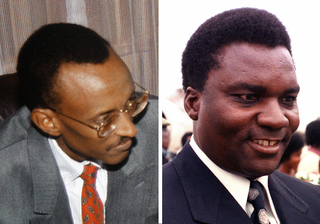
The Rwandan Civil War was a large-scale civil war in Rwanda which was fought between the Rwandan Armed Forces, representing the country's government, and the rebel Rwandan Patriotic Front (RPF) from 1 October 1990 to 18 July 1994. The war arose from the long-running dispute between the Hutu and Tutsi groups within the Rwandan population. A 1959–1962 revolution had replaced the Tutsi monarchy with a Hutu-led republic, forcing more than 336,000 Tutsi to seek refuge in neighbouring countries. A group of these refugees in Uganda founded the RPF which, under the leadership of Fred Rwigyema and Paul Kagame, became a battle-ready army by the late 1980s.

Education in Rwanda has undergone considerable changes throughout Rwanda's recent history, and has faced major disruptions due to periods of conflict. Education was divided by gender whereby women and men had a different education relevant to their responsibilities in day-to-day life. Women were mostly taught housekeeping while men were mainly taught how to hunt, raise animals, and fish. This is because Rwanda was a community-based society where every member had a specific contribution to the overall development of the community. Older family members like grandparents usually took on the role of educators.
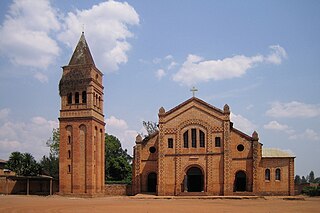
Christianity is the largest religion in Rwanda, with Protestantism and Catholicism being its main denominations. Around 3% of the population claims no religious affiliation, while another 3% practices other religions including traditional faiths. Approximately 2% of the populace is Muslim.
The Presbyterian Church in Rwanda has around 300,000 followers.
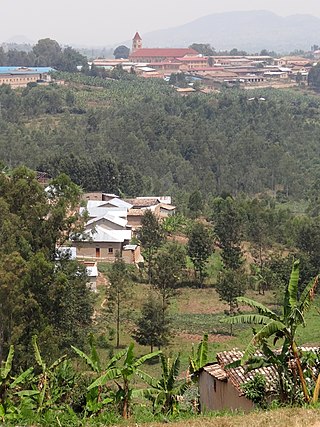
Kabgayi is located just south of Gitarama in Muhanga District, Southern Province, Rwanda, 25 miles (40 km) southwest of Kigali. It was established as a Catholic Church mission in 1905. It became the center for the Roman Catholic Church in Rwanda and is the site of the oldest cathedral in the country and of Catholic seminaries, schools and a hospital. The church at first supported the Tutsi ruling elite, but later backed the Hutu majority. During the 1994 Rwandan genocide thousands of Tutsis who had taken refuge here were killed. Some survivors admire the courage of many priests who helped them during those difficult days, like Father Evergiste RUKEBESHA and many others. Later, some Hutus including three bishops and many priests were killed by the rebels RPF soldiers. A mass grave beside the hospital is marked by a memorial. Inside the Basilica are kept the bodies of the three bishops killed by FPR rebels. Two of them were refused by the Rwandan government to be transferred in their own cathedrals.

The Butaro Hospital is a hospital in Burera District, in the Northern Province of Rwanda. The hospital serves as the district hospital for Burera District and surrounding communities.

Healthcare in Rwanda was historically of poor quality, but in recent decades has seen great improvement. Rwanda operates a universal health care system, and is considered to have one of the highest-quality health systems in Africa.

King Faisal Hospital is a hospital in the Kacyiru area of the Rwandan capital, Kigali. It was established between 1987 and 1991 with the help of the Saudi Fund for Development (SFD). Being the largest referral hospital in Rwanda, King Faisal Hospital, Kigali, spreads over 7.9 hectares. It is located in an upscale area and has 18,000 square meters of floor space distributed over 4 floors and an extension building of 2,285 square meters of floor space. The hospital provides a range of highly specialized medical care, including the diagnosis of diseases and specialized treatment.
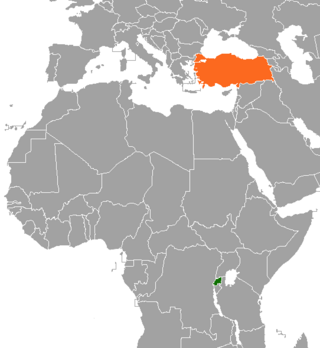
Rwanda–Turkey relations are the foreign relations between Rwanda and Turkey. Turkey has an embassy in Kigali since December 2014. Rwanda's embassy in Ankara opened in August 2013.

Belgium-Rwanda relations refers to the international and diplomatic relations between Belgium and Rwanda. Belgian relations with Rwanda started under the League of Nations mandate, when the modern day countries of Rwanda and Burundi were governed as Ruanda-Urundi. As the colonial power, Rwanda's relationship with Belgium has been significant throughout the country's history, even after independence.

Ndera Neuropsychiatric Teaching Hospital, Known as Caraes Ndera Hospital, is a teaching hospital in Rwanda that provides specialized healthcare in psychiatry and neurology. Founded in 1968, the hospital is located in Ndera Sector, Gasabo District in City of Kigali. The hospital is owned by the Congregation of the Brothers of Charity in partnership with the Government Rwanda, with the Government supporting the hospital in human resource and administrative matters, and the congregation assuring the daily management of the hospital. Following its inauguration, Ndera Neuropsychiatric Teaching Hospital established two branches; CARAES Butare in Huye District, Southern Province in 1976 and Icyizere Psychotherapeutic Centre, in Kicukiro District, City of Kigali in 2003. The most prevalent pathology in psychiatry department at the hospital is schizophrenia, while the predominant pathology in neurology department is epilepsy.















